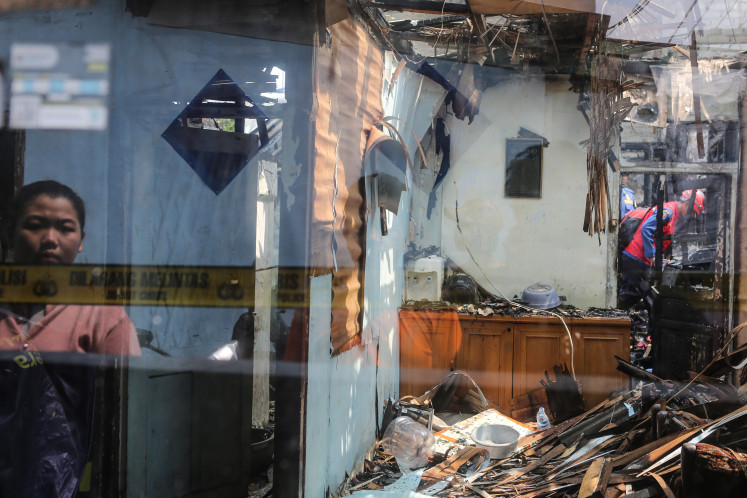Popular Reads
Top Results
Can't find what you're looking for?
View all search resultsPopular Reads
Top Results
Can't find what you're looking for?
View all search resultsPotential pitfalls for Jakarta health program
Jakarta, with more than 10 million inhabitants, has a lot of healthcare problems
Change text size
Gift Premium Articles
to Anyone
J
akarta, with more than 10 million inhabitants, has a lot of healthcare problems. Despite having 341 community health centers (puskesmas) and more than 4,000 integrated health service posts (posyandu), many Jakartans remain unsatisfied with government provided healthcare.
The new Jakarta administration has introduced the Jakarta Health Card program (JHC, or Kartu Jakarta Sehat). It is a form of health insurance for all Jakartans, not only the poor. With this card, every Jakartan can access healthcare service not only in puskesmas, but also third-class service at government and private hospitals.
For this program, Governor Joko “Jokowi” Widodo has allocated Rp 700 billion (US$72.9 million) for 2012, but from the city budget for the Jamkesda healthcare system. According to the chief of the Jakarta Health Agency, Dien Emmawati, the city’s budget allocation for healthcare will be near Rp 2.9 trillion in 2013. The government will allocate about Rp 900 billion for the JHC program, greater than the budget for Jamkesda, which is the health insurance program introduced by Jokowi’s predecessor, Fauzi Bowo. The budget for Jamkesda was only Rp 480 billion in 2010 and Rp 513 billion in 2011.
Jokowi says that JHC has three advantages over Jamkesda: superior financial management, a better records system that will be computerized and include instant access to a patient’s medical history and bureaucratic simplicity, as patient need only present their Jakarta identity card to receive free healthcare. It is expected that by 2013, 4.7 million Jakartans, regardless of their economic background, will have health insurance cards.
Many Jakartans have been seeking healthcare service through the JHC program not because they are sick, but only to prove that the program really works and is free of charge.
The free healthcare services offered by the program, however, should be followed up by ensuring the availability of a significant number of doctors and other healthcare workers to match the expected influx of patients seeking care at puskesmas.
Its noble purpose aside, the JHC program has issues that need to be immediately settled. As to its budget, the JHC still comes into conflict with Jamkesda, as it uses funds allocated for the Jamkesda. Jokowi must therefore discuss the matter with the Jakarta City Council.
Another drawback is that the program only focuses on curative action and does not touch on issues of healthy living and preventive measures. Jokowi, therefore, should issue a regulation promoting healthy living under the JHC program. The regulation, for instance, must exclude smokers or ex-smokers from the program, as the 2007 National Basic Health Survey reveals the prevalence of Jakartans who smoke daily is 24 percent, which is high.
Also, the Jakarta administration should allocate more money for preventative healthcare, such as for the construction of sports facilities where residents can exercise and sidewalks for them to jog or walk on, as survey has revealed that 48.2 percent of Jakartans never exercise or do only little physical activity, leaving them prone to diseases, such as heart attack and cancer.
As part of the program, Jakarta’s leaders, particularly Jokowi, must also actively campaign for healthy lifestyles. He and his deputy, Basuki “Ahok” Tjahaja Purnama, can set an example by jogging or walking at the Senayan Sports Complex or by cycling at the Hotel Indonesia traffic circle on car-free Sundays.
Another measure is the promotion of family-doctor programs. The idea is to improve the role of general physicians in Jakarta’s puskesmas by transforming them into family doctors. With more than 900 general practitioners working at puskesmas across the capital city, the administration could set up a pilot family-doctor program, where one doctor would care for several families in one area and receive funds to carry out preventive programs for the families under the doctor’s care.
The JHC program may also burden the Jakarta city budget. It would be good if the administration can cover the city’s entire healthcare budget, otherwise it will trigger chaos. We do not want Jakarta to suffer like Spain and Greece, which have fallen into financial crises because their respective governments have been troubled by spending on the people’s health and welfare.
The Jakarta administration should also adjust the city’s healthcare system to the national health scheme. If the national Social Security Providers System (BPJS) already works, there will be an overlap of budgets for health insurance schemes for Jakartans.
Another drawback is that many people will directly come to the hospital if the referral system does not work well. Many people are unaware that they first need to go to a primary healthcare provider at a puskesmas. If they skip that step, the hospitals will get a lot of patients. So, the Jakarta Health Agency should ensure that this referral system is enforced. Every Jakartan, unless in case of an emergency, should first go to puskesmas for healthcare service.
It is not easy to implement the JHC, but by focusing on preventivion, he can both improve the health of Jakartans and help control the city’s healthcare spending.
The writer is a physician.










